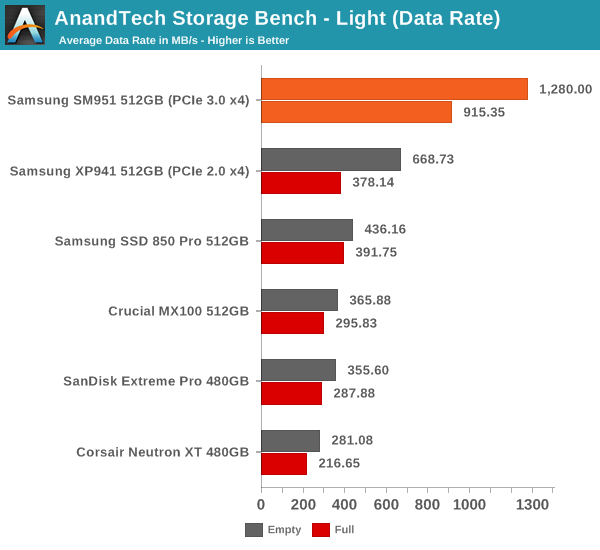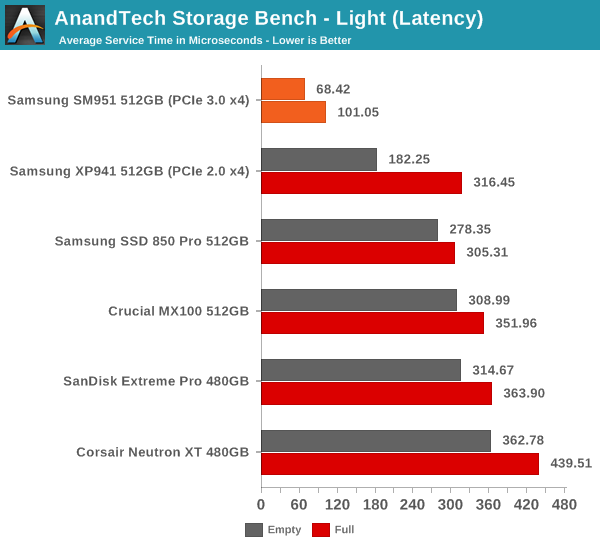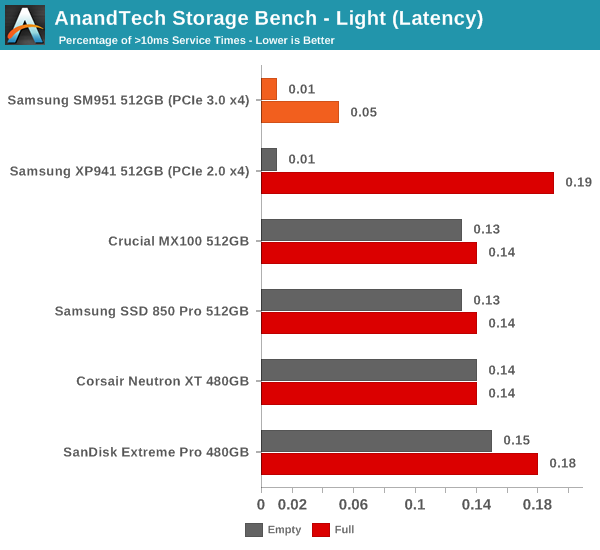Samsung SM951 (512GB) PCIe SSD Review
by Kristian Vättö on February 24, 2015 8:00 AM ESTAnandTech Storage Bench - Light
The Light trace is designed to be an accurate illustration of basic usage. It's basically a subset of the Heavy trace, but we've left out some workloads to reduce the writes and make it more read intensive in general.
| AnandTech Storage Bench - Light - Specs | ||||||||||||
| Reads | 372,630 | |||||||||||
| Writes | 459,709 | |||||||||||
| Total IO Operations | 832,339 | |||||||||||
| Total GB Read | 17.97 GB | |||||||||||
| Total GB Written | 23.25 GB | |||||||||||
| Average Queue Depth | ~4.6 | |||||||||||
| Focus | Basic, light IO usage | |||||||||||
The Light trace still has more writes than reads, but a very light workload would be even more read-centric (think web browsing, document editing, etc). It has about 23GB of writes, which would account for roughly two or three days of average usage (i.e. 7-11GB per day).
| AnandTech Storage Bench - Light - IO Breakdown | |||||||||||
| IO Size | <4KB | 4KB | 8KB | 16KB | 32KB | 64KB | 128KB | ||||
| % of Total | 6.2% | 27.6% | 2.4% | 8.0% | 6.5% | 4.8% | 26.4% | ||||
The IO distribution of the Light trace is very similar to the Heavy trace with slightly more IOs being 128KB. About 70% of the IOs are sequential, though, so that is a major difference compared to the Heavy trace.
| AnandTech Storage Bench - Light - QD Breakdown | ||||||||||||
| Queue Depth | 1 | 2 | 3 | 4-5 | 6-10 | 11-20 | 21-32 | >32 | ||||
| % of Total | 73.4% | 16.8% | 2.6% | 2.3% | 3.1% | 1.5% | 0.2% | 0.2% | ||||
Over 90% of the IOs have a queue depth of one or two, which further proves the importance of low queue depth performance.

The SM951 yet again provides roughly twice the data rate compared to the XP941 and with a full drive the difference is even more significant.

The same goes for average latency where the SM951's score is about one third of the XP941's. The SM951 can without a doubt boost performance with lighter IO loads as well, although in very light workloads the bottleneck tends to be the speed of user input (think about document creation for instance).











128 Comments
View All Comments
3DoubleD - Tuesday, February 24, 2015 - link
While this drive looks great and all, after all the problems the 840EVO has had, it is hard to get excited about big benchmark numbers from a Samsung drive... you never know if they will stay that way. That said, this drive is MLC and not TLC, so less chance of similar issues as the 840EVO. Still, Samsung has a lot of work to repair their reputation with their customers.theduckofdeath - Tuesday, February 24, 2015 - link
Yeah, they only have a bit more than 1/4 of the market. Really suffering from that snafu... I think you're overreacting just a bit... :)3DoubleD - Tuesday, February 24, 2015 - link
How could their past sales possibly have suffered from a problem that is ongoing and developing? How future customers react will depend on whether Samsung properly addresses the current issues. My comment is based on this fact.theduckofdeath - Tuesday, February 24, 2015 - link
I have an Evo 840 and since the performance restoration fix I have not seen any sign of performance degradation on my drive. And that fix was made in October last year.theduckofdeath - Tuesday, February 24, 2015 - link
And just to clarify hwo desperate your trolling attempts are. It took (a limited number of) users a year to realise there even could be issues. That's how rare and hard to notice it was, even though the Evo 840 is probably the most sold SSD ever.K_Space - Tuesday, February 24, 2015 - link
I am not sure if you are aware, however Samsung has released a recent statement to the effect that there remain issues with the 840 EVO drive and the above fix has not provided a permenant resolution:http://www.anandtech.com/show/8997/samsung-release...
I have an XP941 and SD Extreme Pro 480; it'd sensible to see how Samsung deals with the current situation at hand which may tip me and other enthusiasts (? <5% of their SSD sales) one way or the other.
extide - Tuesday, February 24, 2015 - link
Not really, Samsung has many other great drives, even older ones that are/were still great like the 830, 840 pro, etc. Couple teething issues on early TLC drives, thats pretty much what to expect ion this industry. The MAIN thing is that they are infact handling it, and not just shuffling it under the rug. IMHO thats far more important than anything else.smilingcrow - Wednesday, February 25, 2015 - link
"The MAIN thing is that they are in fact handling it"The MAIN thing for me is when they have HANDLED it and the solution sticks over time as only then would I trust one of their TLC drives again.
If that fails I expect a product recall which they haven't offered on the vanilla 840 yet which seemingly still has no fix. No recall = NOT handling it.
3DoubleD - Wednesday, February 25, 2015 - link
Teething issues - OK, that's fine, as long as they fix them, and that's all I've been saying; however, the verdict is still out as to whether they have fixed them or not, and that was my initial point.The minute they apply a permanent firmware fix or, if a firmware fix is not possible, a recall, then they will have handled it and I'd feel future Samsung purchases were justified. This obviously applies most strongly for Samsung TLC products, but how Samsung responds to SSD issues in general should be of interest of any current and potential Samsung SSD owner (TLC or MLC).
cm2187 - Tuesday, February 24, 2015 - link
What problems are you referring to?